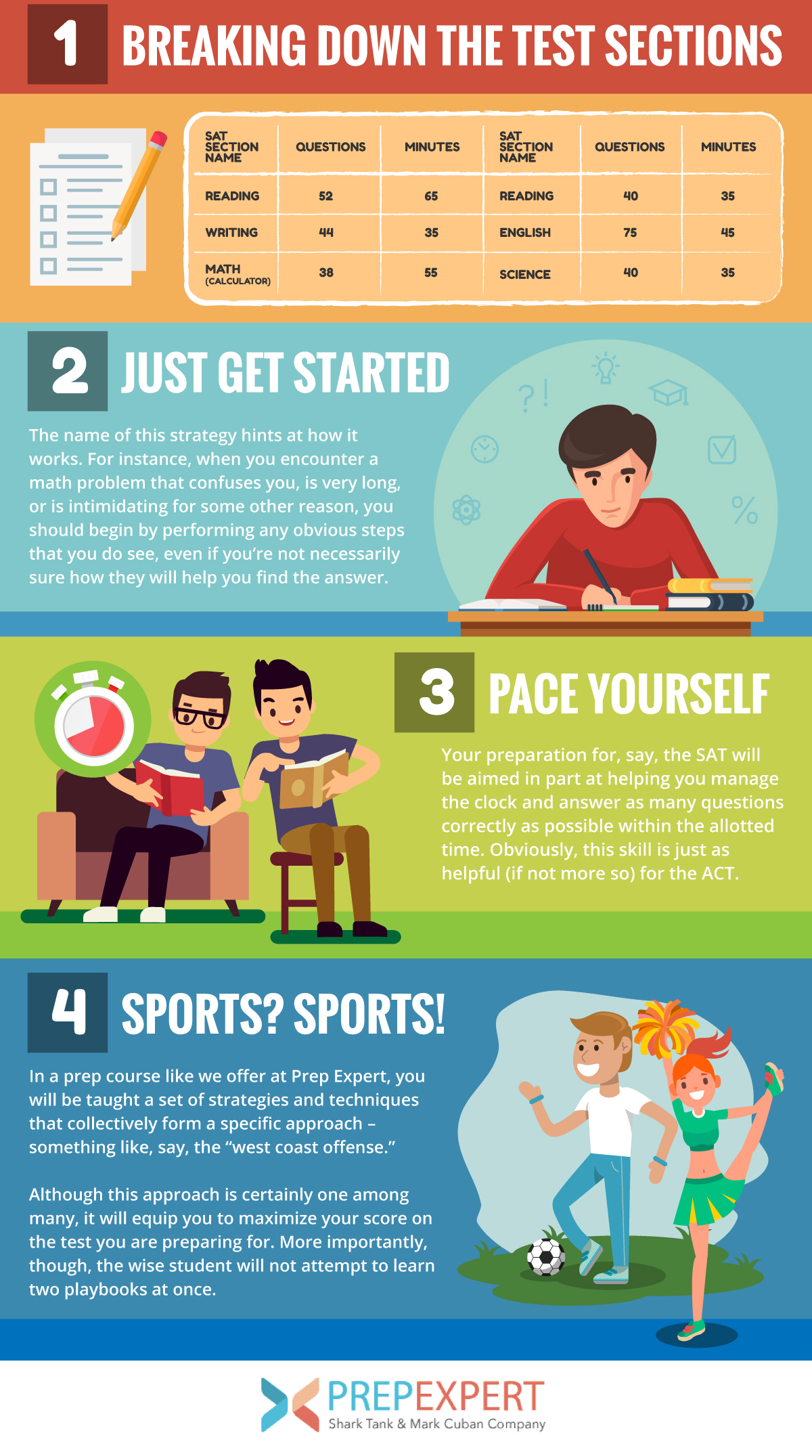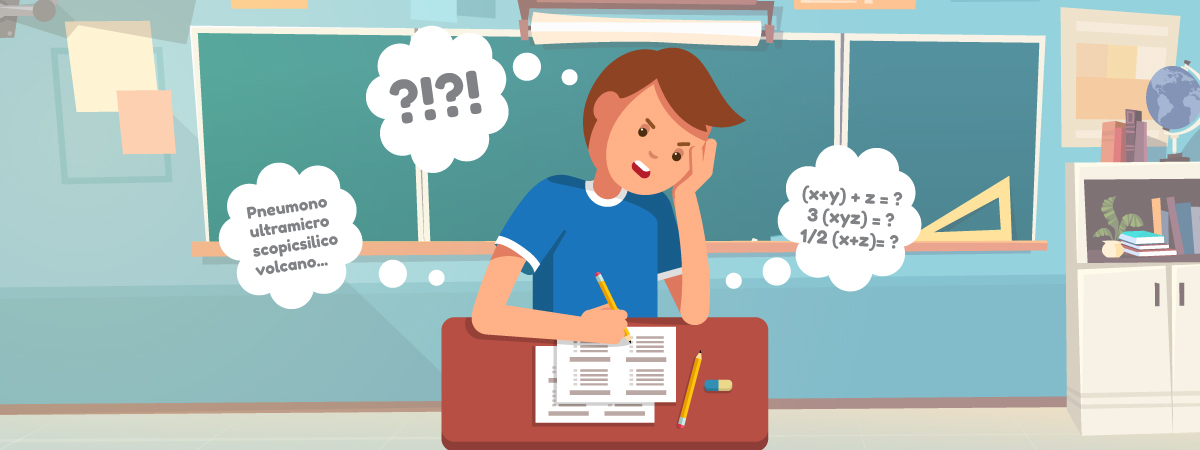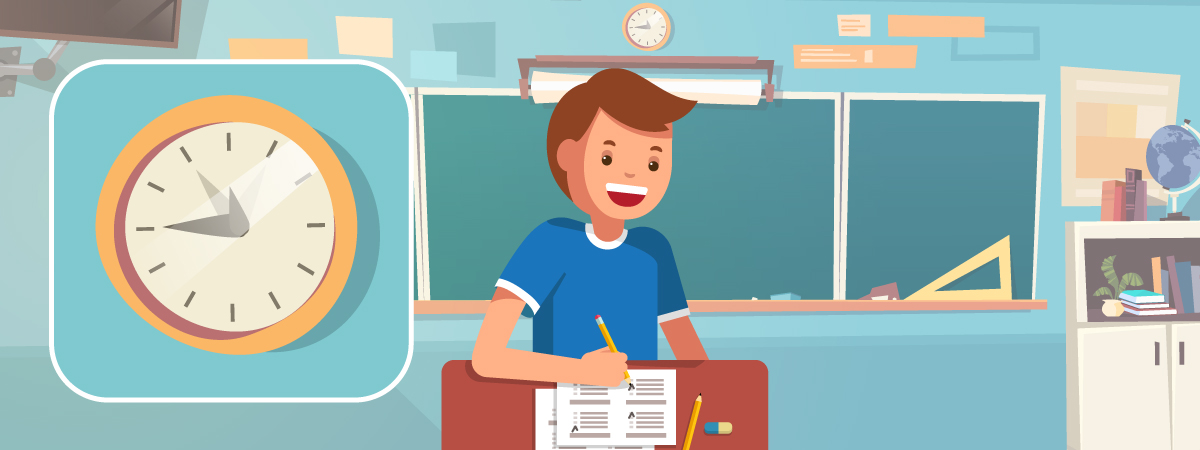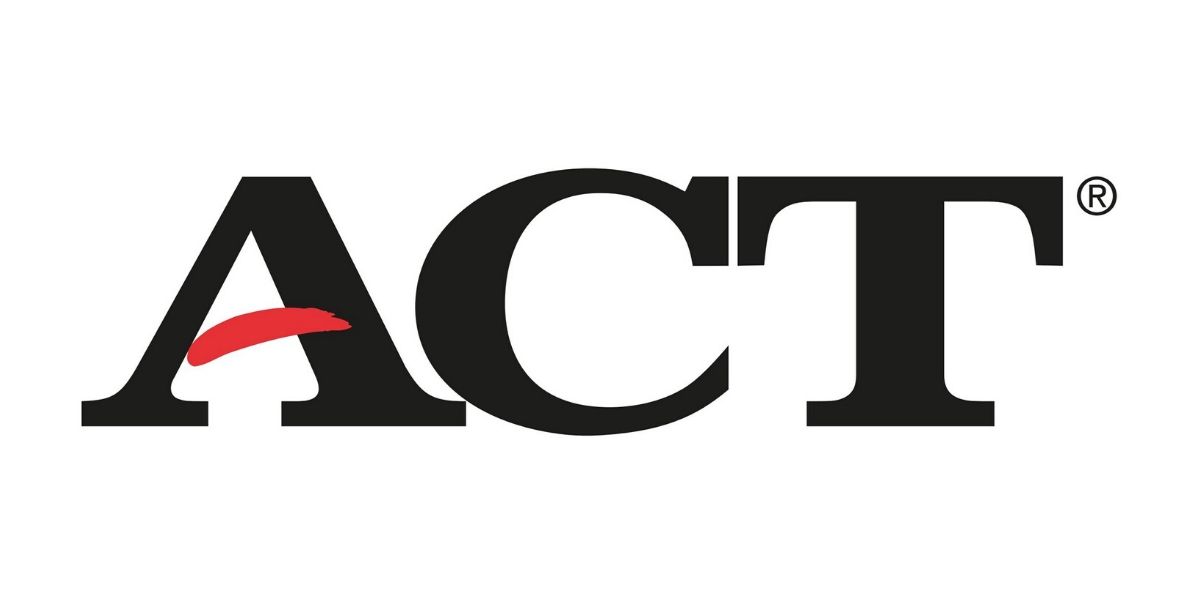Should You Study For The SAT & ACT At The Same Time?
We’re often asked “should I study for both the SAT and the ACT at the same time” by students. The answer may surprise you.
In this article, I will explain and offer you a plan to take advantage of the ability to study for both the SAT and the ACT at the same time.
[sat_one]
For better help on the ACT or SAT, check out our test prep course on our website, Prep Expert.

Breaking Down The Test Sections
Let’s take a look at the section and timing breakdown of the two tests.
The SAT is comprised of four multiple-choice sections and one written essay section. The same is true of the ACT.
See the table below for a list of each SAT section, its number of questions, and the time allotted for that section, as well as the corresponding ACT section, its number of questions, and its time allotted.
Math (No Calculator)2025Math (Calculator)6060
| SAT Section Name | Questions | Minutes | ACT Section Name | Questions | Minutes |
|---|---|---|---|---|---|
| Reading | 52 | 65 | Reading | 40 | 35 |
| Writing | 44 | 35 | English | 75 | 45 |
| Math (Calculator) | 38 | 55 | Science | 40 | 35 |
As you can see, most of the sections on the SAT have directly comparable analogs in the ACT, and vice versa. The obvious exceptions are:
- The SAT’s two math sections (as opposed the single math section of the ACT)
- The ACT’s science section (with no counterpart on the SAT).
The ACT allows less time per question in each section and has more questions overall.
More importantly, the tests largely cover the same material. It is not a secret that these two tests cover the same basic subject material and have the same stated purpose.
Specifically, both the SAT and the ACT are designed to test a student’s comprehension of the concepts taught in a typical high school curriculum in the subjects of mathematics, reading for comprehension, English, and science.
Also, both tests are intended to help college admissions committees measure students’ readiness for college; the two tests are direct competitors with each other but have become more similar over time.
Because of all of this similarity – both in subject matter and in purpose – it is only natural that most work you do to prepare for one test would also tend to help you on the other test too.
For instance, in order to prepare for the ACT, you will probably study the standard conventions of written English by reviewing grammar rules.
That review will also come in handy on the SAT too because it requires you to answer questions based on English grammar rules. The same is true for each of the other subjects as well – math, reading, and yes, even science.
Virtually every subject shows up on both tests (with the exception of science), and students are expected to know many of the same things for both tests.
Most of the best test-taking strategies apply to both the SAT and the ACT. Many of the most effective test-taking strategies will help you equally on each test – because the tests cover much of the same material and have similar formats and structures.
[sat_two]

Just Get Started
Let’s look at a concrete example. At Prep Expert, one of our most commonly-used strategies is called “Just Get Started”.
The name of this strategy hints at how it works. For instance, when you encounter a math problem that confuses you, is very long, or is intimidating for some other reason, you should begin by performing any obvious steps that you do see, even if you’re not necessarily sure how they will help you find the answer.
For instance, if the question concerns a quadratic equation that can be factored, and you’re not sure what else to do, then factor it. Very often, this first step leads to an insight or domino effect that will carry you to the solution. Importantly, this strategy works just as well on the ACT as it does on the SAT.
Remember, both tests want to determine if you are able to handle quadratic equations effectively, which necessarily involves the ability to factor these equations.
The key here is that this strategy is very helpful for both tests. So, if you learn this strategy in our New SAT Course, you will be improving your score on both tests.
Just Get Started is just one example of a strategy that applies to both tests; in fact, most of Prep Expert’s other Expert Strategies apply to both tests as well.
Whether you are working on Writing, Reading, Math, or Science, the skills and techniques you develop while preparing for one of the tests will help you improve on both.

Pace Yourself
Pacing within a section and the ability to use time efficiently are obvious concerns on both tests.
Your preparation for, say, the SAT will be aimed in part at helping you manage the clock and answer as many questions correctly as possible within the allotted time. Obviously, this skill is just as helpful (if not more so) for the ACT.
Similarly, in the Prep Expert SAT Course, you will learn how to use the test’s multiple-choice format to your advantage within the Math sections by practicing a different approach to answering questions that you would use in your high school math classes.
In short, the weakness of a multiple-choice Math test is that, for the most part, the correct answer must be given to you as one of the answer choices.
Very often, we can answer questions more accurately and efficiently by focusing on the answer choices than by beginning with the problem itself.
So, in summary, the two tests are very similar both in content and in purpose. Much of the preparation you do for either test will apply just as well to the other test.
The techniques and approaches Prep Expert teaches will improve your score on both the SAT and the ACT. So, for students who plan to take both tests, how can we take advantage of this similarity? The answer is simple.
[leadmagnet_five]
Focus on one test, and knock it out. Then, turn your attention immediately to the other test.

Sports? Sports!
One analogy that I like to use when discussing these tests with my students is that of an offensive playbook in sports – for example, American football.
In a prep course like we offer at Prep Expert, you will be taught a set of strategies and techniques that collectively form a specific approach. Although this approach is certainly one among many, it will equip you to maximize your score on the test you are preparing for.
More importantly, though, the wise student will not attempt to learn two playbooks at once. In other words, there is any number of strategies and techniques that will help you on the test.
We have chosen for our course to emphasize the most valuable and efficient strategies and techniques. The students who get the most out of our courses are the ones who focus exclusively on the techniques we teach them.
Students who combine two different approaches tend not to fully understand either one and as a result, they do not get the full benefit of a comprehensive, consolidated approach.
A student who tries to learn two different methodologies – or to prepare explicitly for two different tests at once – would be similar to a team trying to run a west coast offense’s plays from the wishbone formation; almost certainly, the plays (and the student) would not succeed.
So, then, what is the best approach for a student who wants to do well on both tests? Learn one playbook by focusing on a specific test exclusively. Once you have mastered this approach and used it to succeed on the test you have been focusing on, you can turn your attention to the other test and prepare exclusively for it.
Because the tests have so much in common, you will be starting from a great position when you turn to the second test. You will have already learned much that applies to both tests and can count on having probably at least half of your preparation done for you.
All that will be left to accomplish is to focus on the few aspects of the second test that are different from the first – say, the newly important Science section if you take the ACT second. You can prepare for these new parts of the test and only brush up on what you have already learned in studying for the first test.
Ideally, a student will allow no more than a month or two between the two tests. This is the perfect amount of time to turn your attention from one test to the other and learn the little that remains for which you have not already prepared.
Importantly, test preparedness has a shelf-life; that is, it tends to decrease as time goes by without further work to prepare. The plan outlined here, however, eliminates this problem by allowing the student to prepare for each test exclusively without a lull in between that the student will have to make up for later.
I hope this has helped you understand how a student can prepare for both the SAT and the ACT at the same time and maximize his or her efficiency in preparing for and then taking both tests.
[sat_three]
For more test strategy, college admissions, and scholarship application tips sign up for our FREE class happening right now!
SAT and ACT Studying FAQ
Should I study for both the SAT and the ACT at the same time?
You should pick one of the two tests and study exclusively for it.
Can studying for one test help with the other?
Many of the most effective test-taking strategies will help you equally on each test – because the tests cover much of the same material and have similar formats and structures.
What are the SAT and ACT testing students for?
Specifically, both the SAT and the ACT are designed to test a student’s comprehension of the concepts taught in a typical high school curriculum in the subjects of mathematics, reading for comprehension, English, and science.
What’s one skill that will help me on both tests?
Your preparation for, say, the SAT will be aimed in part at helping you manage the clock and answer as many questions correctly as possible within the allotted time. Obviously, this skill is just as helpful (if not more so) for the ACT.
Written by Todd Marcus
More from Todd Marcus

Taking The ACT Junior Year
If you're ambitious and want to give yourself plenty of time for score improvement, then consider taking the ACT junior…

ACT 2020 Score Release Dates
Here then are the ACT 2020 score release dates to plan around, as well as, the different kinds of available…

How To Determine Your Average SAT Study Time
If you want a high score on the SAT, then you need to put in the hours. There's no way…